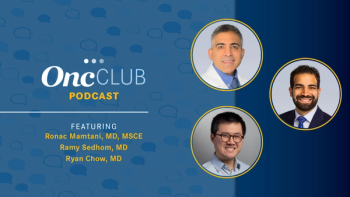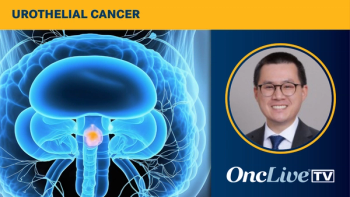
Taylor Provides Insight Into Pirtobrutinib Resistance in CLL

Dr Taylor discusses the significance of BTK inhibition in chronic lymphocytic leukemia, describes the key objectives of, and methods used, for the genomic analyses performed by his team, underscores the clinical significance of the data yielded from this research, and outlines where future efforts will focus.
Welcome to OncLive On Air®! I’m your host today, Kristi Rosa.
OncLive On Air® is a podcast from OncLive®, which provides oncology professionals with the resources and information they need to provide the best patient care. In both digital and print formats, OncLive® covers every angle of oncology practice, from new technology to treatment advances to important regulatory decisions.
In today’s episode, we had the pleasure of speaking with Justin Taylor, MD, an assistant professor in the Department of Medicine, of the Division of Hematology, and a member of the Cancer Epigenetics Program at the Sylvester Comprehensive Cancer Center, of the University of Miami Miller School of Medicine.
Although the development of covalent BTK inhibitors has represented a major advancement in the treatment of patients with chronic lymphocytic leukemia (CLL) and other B-cell malignancies, resistance can arise through several mechanisms. Although noncovalent BTK inhibitors such as pirtobrutinib have been found to overcome this mechanism and other sources of resistance, the mechanism of resistance to this new class of agents has been unclear.
To better understand this, Taylor and colleagues conducted genomic analyses of pre- and post-treatment specimens collected from a subset of 55 patients with relapsed or refractory CLL who participated on the phase 1/2 BRUIN trial (NCT03740529). Findings from the analysis revealed 9 patients who had acquired mechanisms of genetic resistance to pirtobrutinib. With older covalent BTK inhibitors, patients typically developed resistance in BTK at residue C481, particularly C481S, which is the binding site of those inhibitors. However, in this genomic analysis, 7 patients had acquired non-C481 BTK mutations, and these mutations conferred resistance to both noncovalent and certain covalent BTK inhibitors.
In our exclusive interview, Taylor discussed the significance of BTK inhibition in patients with CLL, described the key objectives of, and methods used, for the genomic analyses performed by his team, underscored the clinical significance of the data yielded from this research, and outlined where future efforts will focus.
That’s all we have for today! Thank you for listening to this episode of OncLive On Air®. Check back on Mondays and Thursdays for exclusive interviews with leading experts in the oncology field.
For more updates in oncology, be sure to visit www.OncLive.com and sign up for our e-newsletters.
OncLive® is also on social media. On Twitter, follow us at @OncLive and @OncLiveSOSS. On Facebook, like us at OncLive and OncLive State of the Science Summit and follow our OncLive page on LinkedIn.
If you liked today’s episode of OncLive On Air®, please consider subscribing to our podcast on Apple Podcasts, Spotify, Google Podcasts, Amazon Music, and many of your other favorite podcast platforms,* so you get a notification every time a new episode is posted. While you are there, please take a moment to rate us!
Thanks again for listening to OncLive On Air®.
*OncLive On Air® is available on: Apple Podcasts, Google Podcasts, Spotify, Amazon Music, Audacy, CastBox, Deezer, iHeart, JioSaavn, Listen Notes, Player FM, Podcast Addict, Podchaser, RadioPublic, and TuneIn.




































